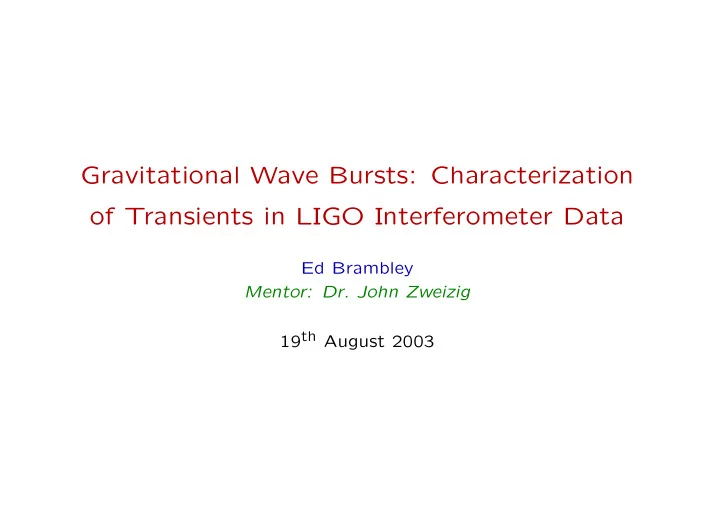

Gravitational Wave Bursts: Characterization of Transients in LIGO Interferometer Data Ed Brambley Mentor: Dr. John Zweizig 19 th August 2003
The Spectrum of LIGO Interferometer Output -10 Power (in dB Hz − 1 ) -20 -30 -40 -50 -60 -70 -80 1 2 3 4 5 6 7 8 Frequency (in kHz) 1
Probability Distributions & Likelihood Ratios • The probability distribution function (pdf) f : � b P ( a < X ≤ b ) = a f ( x | θ ) dx (1) • The hypotheses: H 0 : Data x comes from a pdf f 0 ( x | θ 0 ), for some θ 0 . H 1 : Data x comes from a pdf f 1 ( x | θ 1 ), for some θ 1 . • The log profile likelihood ratio statistic: � � sup θ 1 f 1 ( x | θ 1 ) 2 log (2) � � sup θ 0 f 0 ( x | θ 0 ) 2
Goodness of Fit of Different Distributions 20 Normal Distribution 18 Gamma Distribution 16 Badness of Fit 99 . 99% Confidence Level 14 12 10 8 6 4 2 0 1 2 3 4 5 6 7 8 Frequency (in kHz) 3
Iterative Search Method 0.6 Power (in Units 2 Hz − 1 ) 0.5 0.4 0.3 0.2 0.1 0 0 2 4 6 8 10 Time (in s) 4
Significance of the Signal Found Log Profile Likelihood Ratio 200 180 160 140 120 100 80 60 40 20 0 1 2 3 4 5 6 7 8 Frequency (in kHz) 5
Power Evolution in the 272–304Hz Frequency Band 7e-05 Power (in Units 2 Hz − 1 ) 6e-05 5e-05 4e-05 3e-05 2e-05 1e-05 0 0 1 2 3 4 5 6 7 8 9 10 Time (in s) 6
Results after Post-Processing Transient 1: Transient 2: Start : 3.17969 Start : 6.42969 End : 3.36719 End : 6.55469 Significance: 196.498 Significance: 81.7497 Power : 0.00265712 Power : 0.000221876 Frequency composition: Frequency composition: 208 - 400: 1 272 - 304: 1 Transient 3: Start : 6.88281 End : 7.11719 Significance: 86.5563 Power : 4.19208 Frequency composition: 48 - 80: 1 7
Conclusions • The algorithm created can detect transients — it did so in the example presented. It can also indicate which frequency bands it believes the transients occurred in. • It is susceptible to badness of fit and non-stationarity. • General problems occurred in the 1–3kHz range, where there is the least power. • Specific, isolated problems occurred at 4320Hz and 7168Hz. These frequencies correspond to dramatically higher power than the surrounding frequencies. 8
Recommend
More recommend